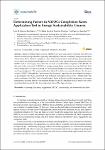| dc.contributor.author | Ramírez-Montoya, María Soledad | |
| dc.contributor.author | Romero-Rodríguez, Luis Miguel | |
| dc.contributor.author | Aguaded, Ignacio | |
| dc.creator | https://orcid.org/0000-0002-1274-706X | |
| dc.creator | https://orcid.org/0000-0002-1274-706X | |
| dc.date.accessioned | 2020-05-14T18:09:22Z | |
| dc.date.available | 2020-05-14T18:09:22Z | |
| dc.date.issued | 2020 | |
| dc.identifier.issn | 2893 | |
| dc.identifier.doi | https://doi.org/10.3390/su12072893 | |
| dc.identifier.uri | https://hdl.handle.net/11285/636325 | |
| dc.description.abstract | Massive Online Open Courses (MOOCs) are open educational activities that allow for distance learning and professional updating, although the academic community has questioned their effectiveness due to their low completion rates. This research analyzes which factors (personal, family, social, labor, and instructional design) are involved in the value expectations and engagement of the MOOCs and to what degree these affect the decision to enroll and the completion of the MOOC. To this end, in the context of 12 MOOCs on energy sustainability carried out between 2017 and 2018, 8737 participants were surveyed using two instruments designed according to theoretical constructs and expert judgment. The main results show that all the factors reviewed influence the decision to take a MOOC, although the “professional development” aspect has the most significant impact on participants who have graduated from technical and engineering careers. Additionally, this study emphasizes that the “instructional design” factor is decisive in the engagement of younger participants, showing that the conventional design of xMOOCs (Stanford Model) may be one of the most important reasons for the low completion rates of this type of course. | es_MX |
| dc.format.medium | Texto | es_MX |
| dc.language.iso | eng | es_MX |
| dc.relation | This research was funded by CONACYT-SENER, grant number S0019201401 and the Ministry of Science, Innovation and Universities of Spain and the European Regional Development Fund (ERDF), grant number RTI2018-093303-B-I00. The APC was funded by the Ministry of Science, Innovation and Universities of Spain and the European Regional Development Fund (ERDF). | es_MX |
| dc.relation.isFormatOf | versión publicada | es_MX |
| dc.relation.url | https://doi.org/10.3390/su12072893 | es_MX |
| dc.rights | openAccess | es_MX |
| dc.rights.uri | http://creativecommons.org/licenses/by-nd/4.0/ | * |
| dc.subject | Educación | es_MX |
| dc.subject.lcsh | Education | es_MX |
| dc.title | Determining Factors in MOOCs Completion Rates: Application Test in Energy Sustainability Courses | es_MX |
| dc.type | Artículo/Article | es_MX |
| dc.identifier.journal | Sustainability | es_MX |
| dc.subject.keyword | engagement | es_MX |
| dc.subject.keyword | MOOC | es_MX |
| dc.subject.keyword | sustainability | es_MX |
| dc.subject.keyword | environmental education | es_MX |
| dc.subject.keyword | e-Learning | es_MX |
| dc.subject.keyword | education | es_MX |
| dc.identifier.volume | 12 | es_MX |
| dc.identifier.issue | 7 | es_MX |
| dc.identifier.startpage | 1 | es_MX |
| dc.identifier.endpage | 11 | es_MX |
| dc.contributor.affiliation | Rey Juan Carlos University | es_MX |

